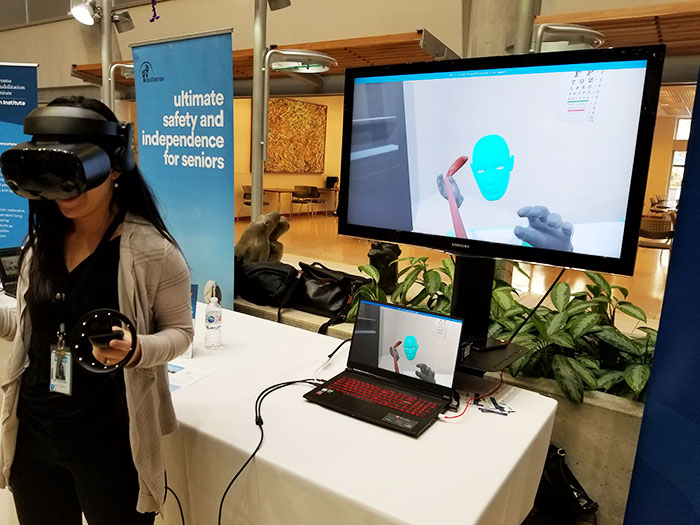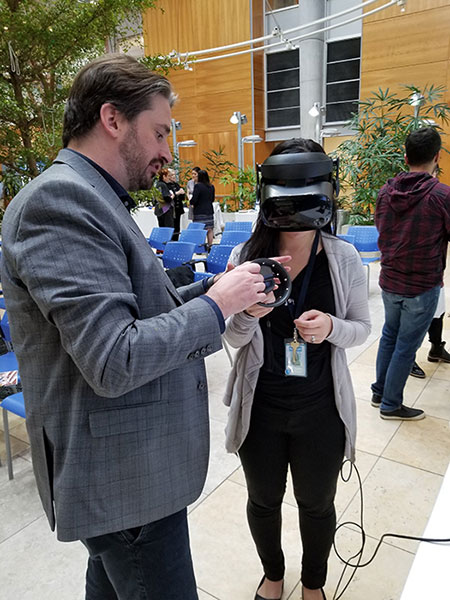
The Michener Institute of Education at UHN, in collaboration with the Ottawa Hospital Research Institute and Baycrest, has been awarded a Spark grant from the Centre for Aging and Brain Health Innovation (CABHI) for their project on Virtual Reality Training for Caregivers of Persons with Dementia.
The Spark Program is an initiative that funds innovative grassroots ideas that can help to improve brain health or quality of life for older adults. The organizations will be funded $50,000 over one year for their work on utilizing virtual reality (VR) to improve training for caregivers.
Providing learning opportunities for caregivers of persons with dementia (PWD) to develop skills that maximize safe, compassionate care is a key priority in health care.
Michener has previously collaborated with clinical educators at University Health Network (UHN) to develop in-person simulation sessions for health care providers who encounter PWD with responsive behaviours. However, in-person simulation has limitations.
“Interactions during the encounter must be limited to ensure that both learners and simulated patients are not physically harmed,” says Kerry Knickle, Director, Simulated Participant Program. “This compromises the authenticity of the simulations and limits the effectiveness of training, as learners are not able to fully experience behaviours that risk progressing to physical threat.”
Michener is collaborating with the Ottawa Hospital Research Institute and Baycrest to develop a VR platform where simulations are delivered in a risk-free environment that leverages opportunities for de-escalation training, situational awareness and perspective-taking. This new platform will address the risks of live simulation and add a new opportunity for empathy building. Caregivers will be able to build empathy as an observer by taking either the perspective of the person with dementia or the caregiver during the interaction.
“The project aims to refine and scale a VR platform and simulation curriculum that will maximize opportunities for effective education for caregivers of persons with dementia,” says Jordan Holmes, Interim Director, Centre for Learning, Innovation and Simulation (CLIS). “This VR platform will allow caregivers to practice behavioural strategies with a live simulated patient that reacts in real time, based on the caregivers’ responses.”

New nurses and other health care providers at UHN are required to participate in a new staff orientation which now includes a session on situational awareness and verbal de-escalation. As many of these staff interact with patients with dementia, delirium, under the influence of substances, or individuals that have an underlying mental health condition and may become upset or distressed, it is important for them to practice techniques to assist in de-escalation.
Traditionally, this training involves learners participating in a simulation scenario with patient actors in which they must de-escalate a patient who has developed delirium and is becoming increasingly distressed. However, the VR project team has asked to work with clinical educators to use their training scenario in the development of this new tool.
“As part of the project, we’ll have the learners divided into two groups,” says Aideen Carroll, Advanced Practice Nurse Educator in Mental Health at UHN. “One group will be interacting with the actors in-person and the other will interact with them through virtual reality.”
Afterward, the groups will debrief to compare their experiences and the methods of delivery.
“This is all very new and exciting for us. The whole idea of virtual reality will help us expand the possibilities of this training and take the objective to a higher level,” says Aideen.
This is the first grant that Michener has been successful in capturing, with Dr. Nancy McNaughton, Education Scholar, CLIS, as Principle Investigator. It will flow through The Institute for Education Research (TIER), which is one of seven institutes within the UHN Research family.